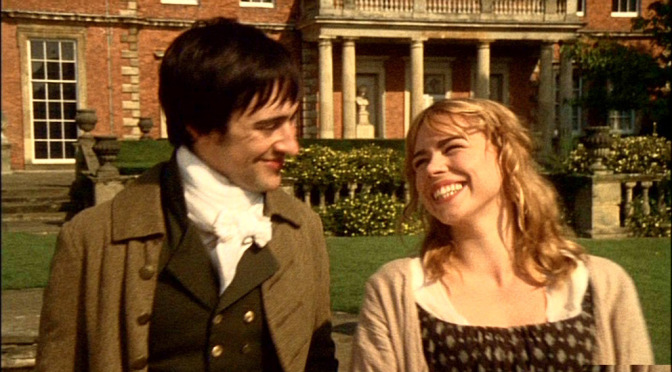There ought to be a law: an adapter must love the work she’s adapting! The purpose of adaptation ought to be translating the work into another medium, not improving it. But improving MANSFIELD PARK was evidently the aim of Patricia Rozema, the writer/director of the new film by that title. As if Jane Austen needs improving.
Ms. Rozema’s “improvement” was made manifest in two major ways: first, in the transformation of Fanny to a modern, feminist version of a heroine; and second, in the overlay of political correctness to the plot. Let’s look at the “improvement” of Fanny’s character first. In the film, Fanny has a sharp tongue, a twentieth-century self-confidence, and she occupies her time in writing. (All this may be attributed to Jane Austen’s character, but Austen did NOT attribute such qualities to Fanny.) Austen saw her heroine in, I believe, a more original and interesting way than Rozema did Though Austen’s Fanny was a painfully shy and recessive character, she had remarkably strong and consistent moral fiber. Her suffering was greater because she couldn’t express it. She had neither the armor of self-confidence nor the weapon of wit with which to defend herself. Yet despite the attacks she endured, her inner convictions remained intact and were never compromised. Her outer helplessness reinforced our admiration of that inner strength. But Rozema, by making her Fanny strong and very capable of dealing with the forces that attack her, weakens our appreciation of that inner moral strength and lessens the effect of Fanny’s triumph at the end.
As for the insertion of a politically-correct interpretation of Sir Thomas’s Antigua dealings, this was, I believe, Rozema’s attempt to disarm the criticism that Austen always receives from male reviewers: that she had no awareness of the political situations of her time. I have no doubt that Rozema has strong feelings about the horrors of slavery, but I do doubt the validity of imposing that conviction on Austen’s story. Is it worth wrenching out of all recognition the character of Tom Bertram to make the now-obvious point that slavery is horrendous? It’s a choice that confuses the viewer. Is this Tom Bertram — who draws heart-felt, agonizing sketches of the horrors he saw in Antigua — the same Tom who instigates the foolish theatricals? It’s hard to know what to make of him. The emphasis on the slavery issue distorts the character of Sir Thomas also. Is the dreadful man who refuses to admit his blame in Antigua the same one who orders a fire for Fanny’s room? (And, by the way, is the filmmaker suggesting that his feeling for Fanny is somewhat sexual?)
I appreciate the difficulties in trying to encapsulate the complexities of a five-hundred page novel into a two hour movie, and I commend the filmmaker for several lovely touches — the swarming birds over the enfogged park; the fireworks-and-doves display Henry Crawford sends Fanny at Portsmouth; the depiction of the comparison between the squalor of the Portsmouth house with the spacious grandeur of Mansfield Park; and others. But I cannot commend her for the weak depiction of Mrs. Norris, for the drug-addicted Lady Bertram, and for the scene in which Mary Crawford, (in an otherwise exciting characterization) declares in front of the entire family that she’d like to see Tom die. A bit too much to swallow, that.
It’s hard for a Janite to determine how this film appears to those in the audience who are unfamiliar with the novel. I suspect that what’s happening on the screen is often confusing to them. I admit that the audience at the performance I attended paid close attention. But when they got up at the end, they didn’t have that air of happy excitement that I felt the audience showed after SENSE AND SENSIBILITY. Emma Thompson loved the book she adapted. That made the difference.
Note from Lady M: This review is for the 1999 film Mansfield Park, and not the 2007 remake (which Elizabeth Mansfield did not live long enough to have seen, sadly). The film apparently caused a bit of a stir among Janites, as my quick search to get the IMDB link uncovered a pile of scholarly defenses of the work presented to the Jane Austen Society.


